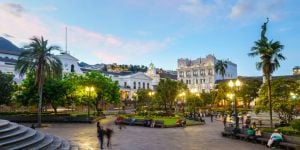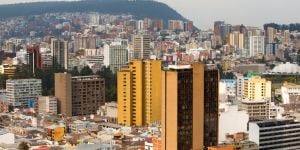Mistakes expats make in Ecuador
Last activity 03 July 2017 by mjbowen3
1710 Views
14 replies
Subscribe to the topic
Post new topic
Hello everyone,
Did you make any mistakes when you first moved to Ecuador? What were they?
How did you address your mistakes? Did you learn anything from them?
With hindsight, what would you do differently?
Are there any tips you could give future expats in Ecuador to help them avoid these kinds of mistakes?
We look forward to hearing from you!
Priscilla
Don't buy or build on property in Ecuador until you have lived in the target area for a minimum of one year. Due to visa rules, this may not be possible to do in one trip.
The classic boner was what's-her-name from the Pacific Northwest who put a deposit on a 'fixer-upper' in San Clemente on the beachfront during her first week visiting the EC coast.
The deal went sideways when it turned out that the property owner was actually multiple heirs of a deceased owner .. and they lived in three different countries.
If Missy had hired a proper lawyer, she might have avoided the deal-disaster by being aware of the ownership complications before she signed the contract.
Once it all went South, we never heard from her again.
cccmedia
A related mistake is reading 'Live and Invest Overseas' and 'International Living' magazine .. and thinking you can buy property in Ecuador, then profitably rent it out with a property manager taking care of the details while you sit back in North America and watch your bank account grow.
In reality, you're signing up for property headaches that include repairs, unexpected maintenance issues, flooding, vacancies, attempting to evict deadbeat non-payers from the property, re-tenanting .. and a variety of other issues. 
The biggest problem of all can be the realization that you have to sell, except you can't find a buyer for years. 
There may be turnkey properties you could buy into in Medellín, Colombia, and some resort areas in some countries. But you better know what you're doing .. and you better have money to burn! 
cccmedia
Here's one you encounter from time to time...
Expats erroneously thinking they're getting deliberately ripped off.
Sure, there's Gringo pricing .. and you may have to pay 20 percent more than the locals for your fruits and vegetables.
But the truth is that most Ecuadorians are honest. Most of the alleged ripoffs are due to misunderstandings -- cultural and transactional -- and outsized expectations based on minimal experience living in South America.
cccmedia
I think one of the biggest mistakes that some people make is having unrealistic expectations. It’s especially detrimental when such unrealistic expectations involve money or supplementing their income in Ecuador. A friend of mine with a dream to be an expat thinks he can supplement his income by day trading. Now of course this makes me roll my eyes because he hasn’t been consistently successful, yet unrealistically expects that to change as an expat. The same with other people who think they will be able to publish successfully and earn some money. My point is if you are not successful in earning money in your own country then do not think things will be any different here.
Another unrealistic expectation is expecting life in Ecuador to be much better for a fraction of the cost of living in developing countries. This is a fallacy if we objectively compare similarities whether they’re groceries, residence, entertainment, education, traveling and so on. If one understands PPP or purchasing power parity they will understand my point. Yes Ecuador’s PPP is approximately at a 1:1.75 ratio but this is true for all of Ecuador including some of the poorest areas and includes free public education and subsidized healthcare.
However if you take into account those free services, and you don’t want your standard of living to drop then the PPP will certainly be nowhere near the official ratio especially in nicer parts of cities. Just have realistic expectations because for the most part you’ll be doing yourself a disservice if you underestimate the reality of cost of living. Have a budget that has a little breathing room to take a break once in a while, a trip back home or wherever. One person stated he was living on less than a $1000 in a one bedroom cabin by the river. If someone lived in a cabin anywhere and watched TV all day and ate $3 almuerzos then they could probably live on less than that anywhere else. So it's all relative but let's not disparage the reality of cost of living based on specific lifestyles. If anything let's just compare.
I had a Gyro for $7, no soda, no chips, no nada. I bought bedsheets from Sukasa the other day and they costed $86, an Ecuadorian friend visited Baños for two days and it costed him $200 a day. A sushi lunch/dinner will be no less than $50 for two, and that’s with a little bit of Sashimi. The culture and language is difficult enough and the last thing a person wants is to be on a tight budget in a third world country. If you do that then after a year or two or three you might be looking elsewhere because of unrealistic expectations.
Last but not least is failure to adapt and in some cases life here might consume you. I used to think it was an age thing, ya know you can’t teach an old dog new tricks, but that is clearly not the case because I come across young people who can’t adapt as well and can’t wait to leave after completing their obligations. And adapting is easier said than done but I truly believe if a person is content with their life then they could be happy just about anywhere.
Judging Ecuadorians based on limited interaction with locals.
Passing judgement on all Ecuadorians based on commercial dealings. It doesn’t get more skewed than that. This is especially true in the services sector that caters to foreigners because there are some people who will take advantage of naiveness and this is true everywhere and in every country. So someone feels they got cheated or were actually cheated and they conclude that Ecuadorians are all cheaters. Again that’s a skewed perception.
It seems that there are those who seek to take advantage, this is true for both gringos and Ecuadorians.......beware of gringos with business cards.
AMDG wrote:It seems that there are those who seek to take advantage, this is true for both gringos and Ecuadorians.......beware of gringos with business cards.
True, and Ecuadorians from developed countries are also to be wary of. And in general it's not so much of cheating, but more so of offering higher prices to expats because they think they can afford it, and also to maintain their own standards of living here.
I remember when looking for an apartment initially and saw this one place which was nice but was a bit small and didn't enjoy as much sunlight. The owner was a western-Ecuadorian and she wouldn't budge from her asking price and I tried to reason with her that there are similar apartments in much better located streets, to no avail.
Quite frankly I was uneasy with her to begin with because that's how it is in many countries when dealing with people who moved back from the developed world. A lot of these people will only rent to extranjeros (foreigners), and their places reflect that taste, and only settle for locals when the market is down, and of course this is purely for monetary reasons as they perceive foreigners as having a good steady income.
vsimple,
You seem to have nailed the answer IMO. Was thinking of moving to EC and becoming an expat. After seeing thoughtful answers like yours, I've decided not to do it - yet. Maybe some day.
From the posts on expat.com, I've incorporated some of the ideas about living simpler and more cheaply and happily right here in the U.S. It's really been a helpful reality check to see what people write from their experiences before heading off.
Thank you and to cccmedia and the many others that share their first hand experiences of living in EC.
You can also mix living part time in the US and part time in Ecuador......the 6 month tourist visa is easy and inexpensive and allows you to enjoy both
IT1 wrote:vsimple,
You seem to have nailed the answer IMO. Was thinking of moving to EC and becoming an expat. After seeing thoughtful answers like yours, I've decided not to do it - yet. Maybe some day.
From the posts on expat.com, I've incorporated some of the ideas about living simpler and more cheaply and happily right here in the U.S. It's really been a helpful reality check to see what people write from their experiences before heading off.
Thank you and to cccmedia and the many others that share their first hand experiences of living in EC.
AMDG advice about part-year residency if possible might be a good idea. Have you tried Ecuador, because regardless of what you read from me or anyone else it is best to see for yourself if living here is a correct choice or not or otherwise that would be a mistake. My posts convey the realities of life in Quito for someone who is from a middle class background and maintains such a lifestyle here in Ecuador, and in other words I don’t compromise my quality of life.
But my posts also convey that if one is able to make a life here they may find happiness. I think the two most important questions a potential expat should ask themselves are:
1. What kind of life do I want?
2. How do I go about achieving that kind of life?
So give it a shot when /if you are ready and on a trial basis.
Not making their home comfortable and really an uncomfortable home isn’t a home as far as I’m concerned. Here’s an example, an expat has moved from Quito to the valley because Quito is “too cold and wet.” So this guy is now living in a boring area (compared to where he lived in Quito). His mistake is not adequately making his home in Quito comfortable because he didn’t want to spend the money.
If your place is cold or wet you should buy a heater(s) and a dehumidifier(s) and allocate a monthly budget to turn them on. But all everyone thinks about is money or saving money and that’s okay but not if it’s at the expense of comfort and health. This makes me wonder were these people just as uncomfortable in their homes prior to moving to Ecuador.
Personally I have accepted the fact that a heater and dehumidifier which I’m waiting for because they cost four times as much here are necessary. Last night it was pouring rain outside and a quick check revealed that it was 100% humidity and 52 degrees. Inside however my place (living room and dining room area) did not go over 60% humidity at 70/72 degrees, and despite that being acceptable I want to bring it down to 50% and hopefully the dehumidifier will help.
If you’re going to live here, maybe it’s wise to consider allocating resources and money to maintaining a comfortable and healthy home.
vsimple wrote:Personally I have accepted the fact that a heater and dehumidifier which I’m waiting for because they cost four times as much here are necessary. Last night it was pouring rain outside and a quick check revealed that it was 100% humidity and 52 degrees. Inside however my place (living room and dining room area) did not go over 60% humidity at 70/72 degrees, and despite that being acceptable I want to bring it down to 50% and hopefully the dehumidifier will help.
If you’re going to live here, maybe it’s wise to consider allocating resources and money to maintaining a comfortable and healthy home.
I have had a persisent cough for a couple weeks probably caused by a cold I had. Over on web MD I was reading up on persistent coughs and one of them was the following:
Reason 6: Air That's Too Dry or Too Moist
"Dry air -- especially common in the winter -- can irritate a cough," Edelman says. On the other hand, cranking up the humidifier too high isn't helpful, either. Moist air can be a trigger for asthma and encourage the growth of dust mites and mold, allergens that may start you hacking.
"People should aim for humidity levels of 40% to 50% in their homes, winter and summer," Edelman says.
For those living in Cuenca or Quito, I wonder what the average level of humidity has been over the past 4 or so months both inside and outside.
Maybe expats planning to live in those cities should bring a a dehumidifier with them. What do you think of this one VSimple?
https://www.amazon.com/Dehumidifiers-Po … &psc=1
Nards Barley wrote:vsimple wrote:Personally I have accepted the fact that a heater and dehumidifier which I’m waiting for because they cost four times as much here are necessary. Last night it was pouring rain outside and a quick check revealed that it was 100% humidity and 52 degrees. Inside however my place (living room and dining room area) did not go over 60% humidity at 70/72 degrees, and despite that being acceptable I want to bring it down to 50% and hopefully the dehumidifier will help.
If you’re going to live here, maybe it’s wise to consider allocating resources and money to maintaining a comfortable and healthy home.
I have had a persisent cough for a couple weeks probably caused by a cold I had. Over on web MD I was reading up on persistent coughs and one of them was the following:Reason 6: Air That's Too Dry or Too Moist
"Dry air -- especially common in the winter -- can irritate a cough," Edelman says. On the other hand, cranking up the humidifier too high isn't helpful, either. Moist air can be a trigger for asthma and encourage the growth of dust mites and mold, allergens that may start you hacking.
"People should aim for humidity levels of 40% to 50% in their homes, winter and summer," Edelman says.
For those living in Cuenca or Quito, I wonder what the average level of humidity has been over the past 4 or so months both inside and outside.
Maybe expats planning to live in those cities should bring a a dehumidifier with them. What do you think of this one VSimple?
https://www.amazon.com/Dehumidifiers-Po … &psc=1
Mine looks identical to that. The only difference is the brand as the one I have is called ProBreeze, which costs $8 more, and perhaps that $8 is for the “whisper technology”, but that model might have it too. I choose ProBreeze because of reviews on Amazon and Youtube.
Simply put, they little thing works, it collects about ¼ cup of water in about 12 hours.
As for humidity numbers, it keeps the humidity at night at 60% similarly to when I have the heater on. This translates to saving me a lot of money because this little thing is basically doing what a 1500W heater is doing. Although the ultimate test will be during the rainy season and that’s when I anticipate I will be using both simultaneously to lower the humidity level during days of consecutive rain to less than 60%.
The good news is we are not continuously plagued by high humidity all the time, for instance right now at around 4:30 PM, the humidity is 45% inside and 74 degrees, which feels perfect. The issue is in the evening especially when the sun doesn’t come out during the day.
Overall I'm happy with the little fella, and it brings joy to my heart when I see the moisture that it collects. 
Other steps to take is to avoid cooking any food that generates steam, like rice or soup in the evening. Or to do and hang laundry on days when the sun is not out. As for health, and having a cough. I went
through that a few months ago, and the cough went away when I started turning on the heater.
This info is for the highlands, and not the coast or hotter areas as the warmer air is able to hold much more moisture than the Andes.
Articles to help you in your expat project in Ecuador
 How to choose the right moving company
How to choose the right moving companyFirst, this is my first article on Expat.com, hope you like it and will be helpful.
 Help by renting and apartment or house in Ecuador
Help by renting and apartment or house in EcuadorSteps for saving money when you will rent sth. in Ecuador
 Moving to Ecuador with your pet
Moving to Ecuador with your petLike most countries, Ecuador has certain rules and regulations regarding traveling with pets. It is better to be ...
 Moving to Ecuador
Moving to EcuadorMoving to Ecuador and bringing all your worldly goods requires appropriate planning. Here are some guidelines that ...
 Food in Ecuador
Food in EcuadorWhat kind of food will you find in restaurants, cafes, and private homes in Ecuador? Many restaurants in Ecuador ...
 Work in Ecuador
Work in EcuadorEcuador is famous as a retirement haven. But you might not want to wait until retirement age to move there and ...
 Healthcare in Ecuador
Healthcare in EcuadorEcuador, as a fast-developing nation, has laws that are constantly evolving, but one thing is certain: the ongoing ...
 Opening a bank account in Ecuador
Opening a bank account in EcuadorA few years back, an expat would just breeze into an Ecuadorian bank, flash their passport and a bank account ...
Find more topics on the Ecuador forum



